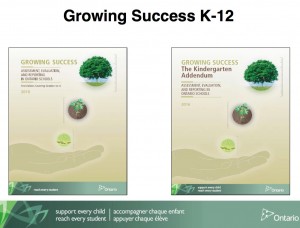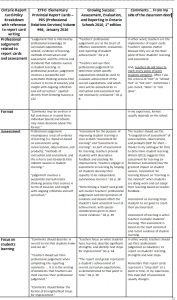
Elementary Report Cards … the mere mention of report cards can send some teachers into anxious ridden days and sleepless nights. Even after 17 years of writing elementary report cards, I anticipated that my levels of anxiety would be non-existent but, no, for me, the thought of report card writing still stresses me out. I know of some colleagues who are so anxious about report card writing, that they had to seek medical support.
The source of this anxiety is embedded in inconsistencies in how report card policy is implemented. And the source of the inconsistencies is rooted in the process of educational policy implementation. With each level of educational policy implementation gatekeepers, such as boards of education, superintendents, schools, administrators, and classroom teachers, all interpret and change the policy based on their own context and their own perspectives (Ball, Maguire, & Braun, 2012).
As report card policy initiatives are translated into real life, the policy stakeholders, like administrators and teachers, adapt and reinvent their interpretation of the policy into school contexts. Since the education policy guidelines tend to be abstract and non specific, confusion and disjointedness results (Ball, 1993), and teachers end up decoding and recoding the policy text such as the reporting policy, Growing Success (Ontario Ministry of Education, 2010). Even with the well written Growing Success document (Ontario Ministry of Education, 2010), the process of understanding and translating report card policy can result in various degrees of intentional and unintentional interpretations (Fuhrman, Clune, & Elmore, 1991). Or, in other words, there are inconsistencies in report card policy implementation. Competing theories between policy authors (i.e., governments and school boards) and report card implementers (i.e., principals and teachers) can cause conflicts between the vision of policy and the practice of policy (Timperley & Parr, 2005). This can result in gatekeepers’ experiencing “most carefully planned” initiatives unfolding in a “non-linear manner” (Timperley & Robinson, 2000, p. 47).
This policy implementation process results in the practice of report card writing that look different from the vision of the report card policy writers. Therefore, because of this flux, report card formats and content can change from school board to school board, school to school, year to year, administrator to administrator, and sometimes even term to term (Note: this is strictly based on my own experience over 17 years). As noted earlier, at every level of implementation, each person put their own spin on the policy. The result is that teachers have to deal with changing report card writing expectations. Inconsistencies directly result in teachers having to spend a great deal of time trying to meet the expectations of different stakeholders. Teachers then have to use their professional judgement to interpret these expectations.
The document Growing Success (Ontario Ministry of Education, 2010, p. 152) states “ Judgement that is informed by professional knowledge of curriculum expectations, context, evidence of learning, methods of instruction and assessment, and the criteria and standards that indicate success in student learning. In professional practice, judgement involves a purposeful and systematic thinking process that evolves in terms of accuracy and insight with ongoing reflection and self-correction.”
Further, Growing Success states that “successful implementation of policy depends on the professional judgement of educators at all levels, as well as on educators’ ability to work together” (Ontario Ministry of Education, 2010, p. 2). It is through educators’ collaboration that educational change becomes reality; it is how policy becomes practice. “Teachers’ professional judgements are at the heart of effective assessment, evaluation, and reporting of student achievement.” (Ontario Ministry of Education, 2010, p. 8). So teachers, working with other stakeholders, using their professional judgement need “to clarify and share their understanding of policy and to develop and share effective implementation practices” (Ontario Ministry of Education, 2010, p. 2).
Below is a breakdown of the Growing Success policy based on areas I have needed information on while writing report cards. This is not an exhaustive list. Please refer to the documents noted below for further information.
Ontario Report Card Policy Breakdown with reference to report card writing
The Growing Success document notes the following “It is important that teachers have the opportunity to compose and use personalized comments on report cards as an alternative to selecting from a prepared set of standard comments. School boards should not enact policies that prevent teachers from providing personalized comments on report cards. It is expected that principals will support best practice and encourage teachers to generate their own comments.” (Ontario Ministry of Education, 2010, p. 64)
Given the focus of encouraging “teachers to generate their own comments”, having a bank of pre-approved board-wide report card comments available to elementary teachers may or may not be forthcoming.
After the above analysis and reflection regarding report card writing and professional judgement, I ask myself “What has helped me the most in report card writing?”
My answer is collaborating with other teachers. It is in the discussion, co-creating, and sharing of report card comments that I have been supported the most in my writing of the Progress, Term 1, and Term 2 report cards. For me, sharing report card comments does not mean that I simply “cut and paste” my colleagues’ work. This does not happen because I write comments through the lens of my own teaching practice. My colleagues’ shared learning skill comments often inspire me to write comments especially for challenging students.
In writing report cards, I use my professional experience and knowledge that has resulted in the development of my professional judgement. So my advice to any teacher who is being challenge in report card writing is to reach out to your colleague … for advice, support, or debate.
I believe that when working collaboratively, teachers are better together … especially when writing report cards.
Collaboratively Yours,
Deb Weston
References
Ball, S. (1993). What is policy? Texts, trajectories, and toolboxes. Discourse, 13(2), 10-17.
Ball, S. J., Maguire, M., & Braun, A. (2012). How schools do policy: Policy enactments in secondary schools. New York, NY: Routledge.
Elementary Teachers Federation of Ontario. (ETFO). (2016). The elementary provincial report card continued implementation update – Grades 1 to 8, Professional Relations Services, PRS, Volume #66, January 2016. Retrieved from http://www.etfo.ca/SupportingMembers/Employees/PDF%20Versions/The%20Elementary%20Provincial%20Report%20Card%20Continued%20Implementation%20Update%20-%20Grades%201%20to%208.pdf
Fuhrman, S., Clune, W., & Elmore, R. (1991). Research on education reform: Lessons on the implementation of policy (pp. 197-218). AR Odden, Education Policy Implementation. Albany, NY: State University of New York Press.
Ontario Ministry of Education. (2000). The Ontario Student Record (OSR) Guideline, Retrieved from http://www.edu.gov.on.ca/eng/document/curricul/osr/osr.pdf
Ontario Ministry of Education. (2010). Growing success: Assessment, evaluation, and reporting in Ontario schools, First Edition, Covering Grades 1 to 12 Retrieved from http://www.edu.gov.on.ca/eng/policyfunding/growSuccess.pdf
Timperley, H. S., & Parr, J. M. (2005). Theory competition and the process of change. Journal of Educational Change, 6(3), 227-251.
Timperley, H., & Robinson, V. (2000). Workload and the professional culture of teachers. Educational Management & Administration, 28(1), p. 47-62.
Wiliam, D. (2011). Embedded formative assessment. Solution Tree Press.

